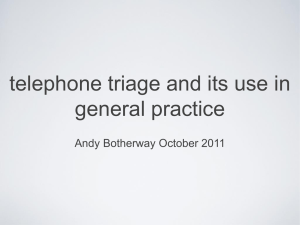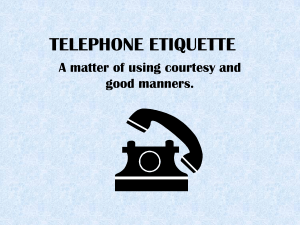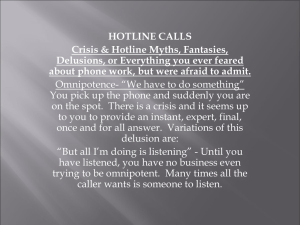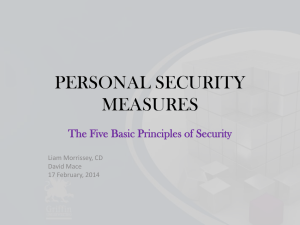Safety Tips for Senior Citizens PowerPoint
advertisement
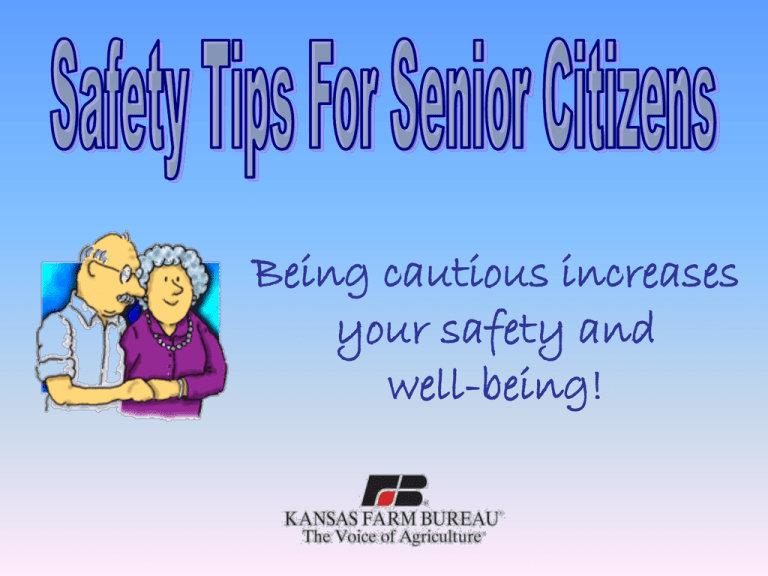
Being cautious increases your safety and well-being! According to the 2011 Census Bureau, senior citizens make up 13.3% of the US population. Why are senior citizens considered “easy” targets to criminals? – – – – May have a nest egg to spend or invest Might be lonely and more willing to talk to strangers Less likely to report fraud than other age groups May appear weaker than younger members of society • • • • • Home Household tasks Over the Telephone At the Door Safety on the Street Securing Your Home Windows: Double hung window locks should be reinforced by manufactured locks that restrict window openings to 6 inches. Windows hidden from view must be securely protected. Shrubs: Should be kept low enough to not block possible points of entry or conceal a potential attacker. Basement Windows: Basement windows can be secured externally or internally by mounting expanded metal screen to foundation of the house Securing Your Home Doors: Doors Locks: Solid core wood doors with rugged frames provide resistance against forced entry. Must use all three: - Security strikes - Stress tested dead bolts - Mag (metal sleeve around lock) Lights: May include: - Motion detection lights - Sun sensor lights - Street lights Securing Your Home Garage: - Windows should be covered and screened from the inside to reduce visibility and entry. - Thin panel garage doors should be secured from the inside with security screens or metal bars. Sliding Glass Doors: Should include: - Track locks and charlie bars - Use upper track screws to keep door from being lifted off its rail Safety At Home Basic Tips… • Post emergency phone numbers by the phone • Arrange for someone to make regular check ups • Give an extra key to a trusted neighbor • Be sure others know of your medical needs Other Home Tips: While Moving Around… Make sure lamp, extension and telephone cords are placed outside the flow of traffic Carry a cell phone or other emergency notifying device with you in case of trips and falls Have small rugs and runners that are slip resistant Have an evacuation plan and practice it Light up entry doors, hallways and stairs In the Kitchen… When you answer the phone to a strange caller: - Control the conversation and the information flow - Do not volunteer information and never give out personal information over the phone - When the caller asks, “Who is this?” you respond, “Whom are you calling,” or “Whom do you wish to speak to?” If the caller gives no appropriate response, hang up - If in doubt, ask the caller for the name of business and telephone number so you can ensure the callers identity and can return the call if it is legitimate - Do not ever admit to being alone. If asked about another member of the household, simply respond, “They are busy at the moment may I take a message?” - If something sounds too good to be true, it probably is • Never open your door to a stranger • You should have a one-way peephole installed in the door that allows you to see who the caller is (The one-way peephole is inexpensive and easily installed) • If a stranger is legitimately at your door, he / she will not object to you being cautious • Establish the stranger’s identity and the reason for the visit. If he / she refuses to show identification and will not leave, quietly go to the telephone and notify the police • Should the caller produce identification but you still are not sure of the validity of the visit, telephone the caller's business office for confirmation • If you still feel uncomfortable, do not open the door; ask the caller to return in 30 minutes or an hour. This will allow you sufficient time to contact a friend or relative to be present when the caller returns NEVER: -CARRY LARGE SUMS OF MONEY -FLASH YOUR MONEY FOR ALL TO SEE -CARRY VALUABLES IN FULL VIEW If you are going to the store for groceries, take along only the amount of money you feel you will need. Be alert when you are carrying a purse on the street or in a store. Use a shoulder strap model and keep it tucked between your body and your arm. Do not dangle a purse by the straps or hold a clutch-style purse just in the hand. If your purse is a clasp type, carry the purse so that it opens towards your body. DO NOT wrap purse straps around your wrist or you could be dragged along or knocked to the ground in the event of a "snatch". Make a copy of everything in your wallet in case it is lost or stolen Kansas Farm Bureau wants you to… Stay Safe Stay Informed Use Common Sense and Practical Judgment!! Information Provided By: National Crime Prevention Council Port Arthur Police Department 2011 US Census Bureau Kansas Farm Bureau Safety Division

